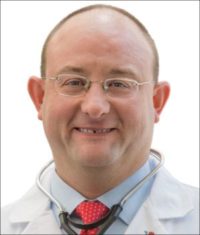UT Health San Antonio has recruited Allen S. Anderson, M.D., FACC, FAHA, to direct and expand the university’s many initiatives in cardiology and cardiovascular disease education and research.
Dr. Anderson is a nationally recognized leader in heart failure and cardiac transplantation at the Northwestern University Feinberg School of Medicine in Chicago. On Nov. 1, he will assume duties as professor of medicine and chief of the Janey and Dolph Briscoe Division of Cardiology at UT Health San Antonio.
Brian Reeves, M.D., chairman of medicine in the university’s Joe R. and Teresa Lozano Long School of Medicine, announced the recruitment. “Dr. Anderson built very successful programs at the University of Chicago and at Northwestern,” Dr. Reeves said. “Working collaboratively with other teams within our university and in very close partnership with University Health System, I am confident that the Division of Cardiology and the Heart and Vascular Institute will enhance our role as the premier provider for complex cardiovascular care in this region. These are very exciting times, and I believe our academic health center is about to enter a new era in cardiovascular medicine.”
The Heart and Vascular Institute, a clinical partnership between UT Health San Antonio and University Health System, encompasses cardiac surgery, interventional and structural cardiology, electrophysiology and advanced cardiovascular disease diagnosis, among its programs. University Health System is supporting Dr. Anderson’s recruitment and expansion of the cardiology programs.
Dr. Anderson is professor of medicine and section chief for heart failure and cardiac transplantation at Northwestern and created a ventricular assist device program there. Under his leadership, the Northwestern program performed 57 heart transplants in 2018, the most ever in the state of Illinois, and implanted 75 left ventricular assist devices. For patients suffering from advanced heart failure, these battery-powered devices serve as a bridge to a heart transplant or other lifesaving surgery.
Dr. Anderson also has significant experience in implementing early phase clinical trials of novel therapies in cardiology.
“Dr. Anderson is an outstanding program builder, clinician, clinical trials designer and educator who has trained many fellows in the treatment of heart failure,” said Robert A. Hromas, M.D., professor and dean of the Long School of Medicine. “His expertise fits perfectly with our interest in obesity and diabetes, because people with these conditions often develop heart failure. Diabetic heart disease is a major health concern in our region. UT Health San Antonio is home to one of the top research programs in Type 2 diabetes in the world, and Dr. Anderson’s recruitment will facilitate the development of new treatments to prevent or reverse diabetic heart disease.”
In an interview at Northwestern in 2013, Dr. Anderson said: “I always wanted to be a physician. My dad had lifelong cardiac problems, so I became interested in cardiology at an early age. I discovered during fellowship that I really enjoyed caring for heart failure patients. I was lucky to enter a field that was just blossoming with respect to therapies, so I had the opportunity to care for really sick people who could be helped with novel evolving therapies.”
Dr. Anderson is a graduate of Mercer University and the Emory University School of Medicine.He was a medical resident, including senior chief medical resident, at NYU Medical Center/Bellevue Hospital Center in New York. He completed a fellowship in cardiovascular diseases at the University of Chicago and a fellowship in heart failure and transplantation at Columbia Presbyterian Medical Center in New York.
# # #
Stay connected with UT Health San Antonio on Facebook, Twitter, LinkedIn, Instagram and YouTube.
The University of Texas Health Science Center at San Antonio, now called UT Health San Antonio®, is one of the country’s leading health sciences universities. With missions of teaching, research, healing and community engagement, its schools of medicine, nursing, dentistry, health professions and graduate biomedical sciences have produced 36,500 alumni who are leading change, advancing their fields and renewing hope for patients and their families throughout South Texas and the world. To learn about the many ways “We make lives better®,” visit www.uthscsa.edu.


